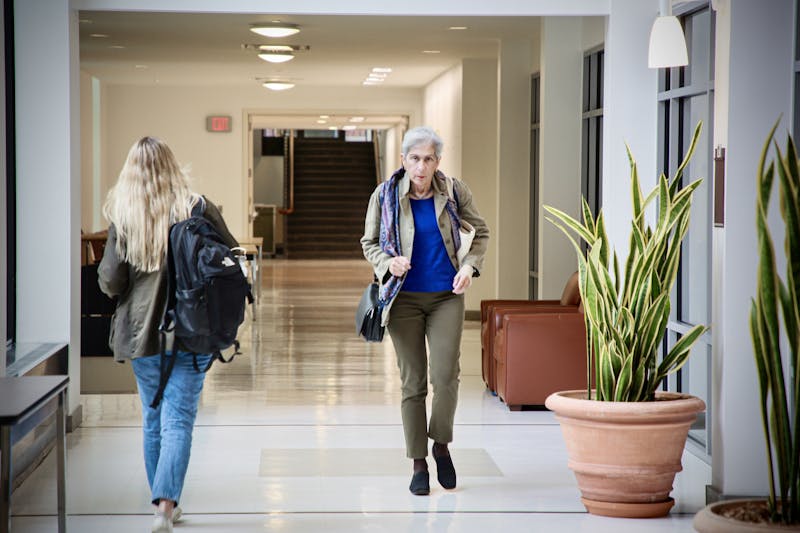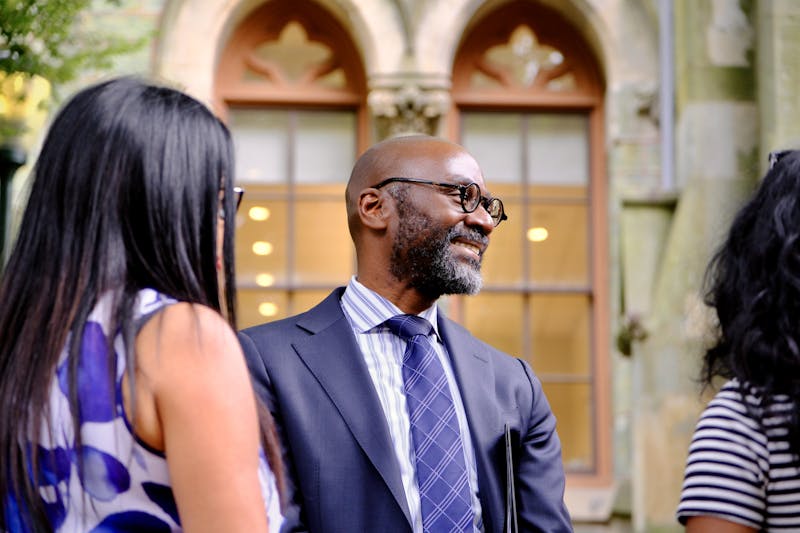Rob Wagner guides Penn strength training from his office under Franklin Field. It's fitting that Rob Wagner's office in the Weiss Weight Room resembles a control room. Wagner may not call the plays at football games, handle the clipboard at the Palestra or pace the sidelines at Rhodes Field, but as Penn's strength and fitness coach, he's the underlying force behind the strength, conditioning and agility of Penn's varsity teams. Buried deep in Franklin Field, the 5,000 square-foot facility couldn't be further from the bustle of weekend warriors and sorority sisters working out at Gimbel in the heart of campus. But to Penn's varsity athletes, the Weiss facility is the epicenter of their conditioning world. And Wagner, with a window-lined office that gives him a sight line to every corner of the facility, orchestrates it all. Crammed with books and papers, decorated with motivational quotes and a few of Wagner's powerlifting trophies, the office is an unlikely place to find humor. But next to words of inspiration like "make it happen" and quotes from Calvin Coolidge and Soviet weight-lifting great Yuri Vasilov hang pearls from Wags himself --"Misery is good," which the athletes mimicked until it earned a spot on the wall -- and from former Penn defensive tackle Larry Rascoe: "I would say my strength is my strength in general." And at times, there may even be a little warm and fuzzy feeling in the weight room. "They make the cold weights feel warm and inviting," Penn basketball player Oggie Kapetanovic says of Wagner and top assistant Jim Steel. While the quip is clearly an exaggeration, Steel does have a note of appreciation from the women's soccer team hanging on the wall, complete with bubble letters, smiley faces and a heart. Still, Wagner says, "I think the kids would describe me, and Coach Steel, as very sarcastic," admitting that at times he can be "very sarcastic" and "brutally honest" or "blunt" in his assessment of things. But personality aside, Wagner and his assistants provide an invaluable resource to Penn's athletes. "[Team] coaches teach you skill. But the strength coaches help you use the skill to the fullest potential of your body," Kapetanovic says. As strength and fitness coach, Wagner is quick to point out that his position is about much more than just teaching athletes how to lift weights. "Our job shouldn't be called strength and conditioning coach -- it should be termed athletic development coach," Wagner says. "There's also speed and conditioning, there's agility work, there's a variety of things that you go through." Ideally, the strength and conditioning coaches at Weiss -- which is open every day -- work with teams three times a week out-of-season and try to see the athletes two days a week in-season. There are specially tailored programs to meet the needs of each varsity team. The present state of the program, however, is a far cry from the days before Wagner came to Penn in '91. "When I arrived as a wrestler, there really wasn't a strength program at all -- it was really just athletes doing their own thing," says wrestling coach Roger Reina, a 1984 Penn grad. "When coach Wagner came on board, he added a combination of very organized structure to the weight room while obviously bringing a lot of competitive knowledge to the table through his own success as a competitive lifter. He also brings a very serious, success-minded attitude -- he wants athletes to make a real commitment and approach their strength work with a no-limits kind of approach." It would be difficult to imagine an individual better suited to his position than Rob Wagner. A member of the USA National Powerlifting team, Wags redefines what it means to be powerfully compact. He holds national records in the squat in three weight classes -- as a 198-pounder in 1992 he squatted 799 pounds -- and earned a gold medal at the World Championships in 1996. But even before he ever set foot on a college campus or wrapped his fingers around his first Olympic weight bar, lifting was in his blood. "My father was an avid weight lifter. I guess that was sort of unique, but as a kid I just assumed everybody's parents lifted weights," said Wagner, who has been competitively powerlifting since his senior year in high school. "It's always really been sort of a way of life for me." In Wagner's estimation, there were maybe 15 to 20 strength coaches in employment around the country at the professional or top college level when he was in college in the mid-'80s. In most cases, like the pre-Wagner days at Penn, if a strength coach existed at all it was merely a football coach on double duty. In little over a decade, though, the field was revolutionized. Today, Wagner says, all Division I schools have some type of strength coach on staff. Harvard, Penn and Princeton are the only Ivy League schools that don't employ both a full-time head and full-time assistant strength coaches. And Penn's Weiss Weight Room, which opened in 1993, is already one of the smallest facilities in the league. "Our usage went up about 300 percent in the first year this place was open," Wagner says. "We outgrew it in the first year we were here." But despite having "just" 5,000 square feet of space and two main coaches to handle with 1,100 athletes, the program draws praise from coaches and athletes alike. "I think that over the past years we've developed a system that has lent deep-seated confidence to our athletes as they take the mat," Reina said. "We see a very definite advantage in terms of strength and conditioning development with our athletes compared with all the Ivy League and regional schools we compete with." And their expertise extends well beyond traditionally strength-focused sports like wrestling and football. "We ask our guys constantly if they're in the weight room and working with those guys because I think it can just make them nothing but better," says Penn men's basketball coach Fran Dunphy, who admits that when he was in college basketball, players shunned weights for fear of adversely affecting their shooting technique. Of course, not every team is a total success story. "We're responsible for every team. In reality are there teams that we don't have contact with? Most definitely," Wagner says. "There are some coaches who either don't feel that weight training is necessary for their sport or just don't show the commitment to get their kids in here." Wagner believes that the program works most efficiently when the strength coaches have open lines of communication with the team coaches. Thus, he finds frustration when coaches or athletes either assume they already know what's best for themselves, have the technique down pat without need for instruction or try to push programs they learned about elsewhere but may only know little about and that may not be best suited for Penn. "[We'll hear] kids say, 'Coach, I got this program from the Washington Redskins, this is what they do?' Or a coach may say, 'I heard about this program from Ohio State?,'" Wagner says. "We're not the Washington Redskins. We're not the Ohio State Buckeyes. We're not anybody but the University of Pennsylvania Quakers. And what they have to understand is what is delivered to them in the workouts is designed so that a majority of the kids on that team will benefit." Still, they have their share of success stories. "Jimmy McGeehan is one example of a kid who we were able to grab who thought weight training basically was a load of bunk," Wagner says of the former Penn quarterback. "He really just fought everything we were trying to do, he would just come in and B.S. his way through the workout, going through the motions." But Wagner made McGeehan his personal project, guiding McGeehan through his training. After two sub-1,000 yard passing seasons, McGeehan tossed for 2,197 yards in '93, a record that stood until Gavin Hoffman broke it last season. "He was the first kid who ever came back to me and said, 'Coach, you were right. This really helped me out and made a big difference for me on the field.'" Wagner boils his job down into a simple matter of teaching. "Teacher-student ratio? that's really what we're all about. We're here to teach kids how to get better, regardless of what the skill is -- lifting, sprint work, running."
The Daily Pennsylvanian is an independent, student-run newspaper. Please consider making a donation to support the coverage that shapes the University. Your generosity ensures a future of strong journalism at Penn.
DonatePlease note All comments are eligible for publication in The Daily Pennsylvanian.







